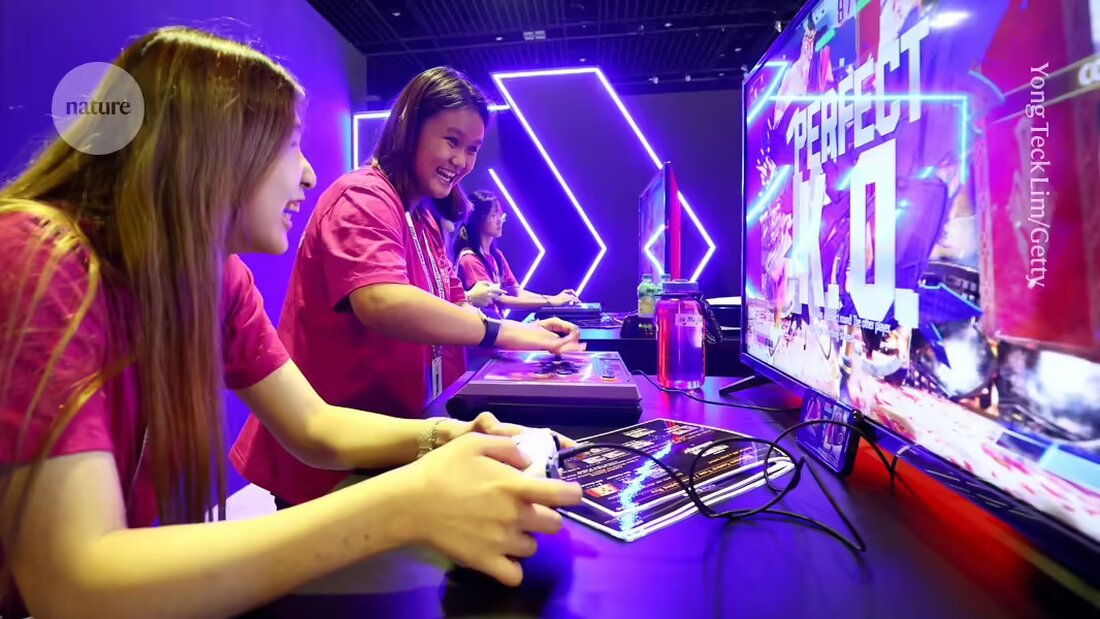Playing video games for a few hours a day can improve mental health, according to a study of gamers in Japan during the COVID-19 pandemic 1.
The research – which was conducted from December 2020 to March 2022 – found that simply owning a games console increased life satisfaction and reduced psychological distress. The results were announced todayNature Human Behaviorpublished.
The findings are a first step toward demonstrating a causal link between gaming and mental health benefits, says Andrew Przybylski, a psychologist who studies how video games affect players' mental health at the University of Oxford, UK. “The study provides an example that gaming researchers around the world should follow closely,” he says. However, it could be that conducting the experiment during the pandemic amplified the mental health benefits of gaming, as people's mental health was generally poorer at the time and there were fewer opportunities to engage in other activities. The impact on well-being needs to be tested outside of this situation, says Przybylski.
Although studies have examined the effects of gaming on addiction, well-being, cognitive function, and aggression, the results have been mixed 2, 3. This research relied largely on observational data, which cannot be used to distinguish cause from effect, says study co-author Hiroyuki Egami, a behavioral scientist at Nihon University in Tokyo. Many video game studies are also conducted in controlled laboratory environments, making it difficult to assess the effects of gaming on mental health in daily life, adds Egami.
Players unite
Around three billion people play video games worldwide, and that number has increased during the pandemic. In Japan, this increase in demand led to a shortage of Nintendo Switch and PlayStation 5 (PS5) consoles. To deal with this, retailers set up a lottery system that randomly selected consumers who could purchase a console when it became available. Egami and his colleagues saw this as an opportunity to conduct a natural experiment about play and mental health.
The study focused on 8,192 people between the ages of 10 and 69 who participated in the lottery. The team collected information about their mental health, video game ownership and sociodemographic characteristics. Researchers sent participants five rounds of surveys that included two checklists measuring psychological distress and life satisfaction. Participants were also asked whether they had played video games in the past 30 days and, if so, for how long.
Participants who had the opportunity to purchase a Switch or PS5 console experienced a decrease in psychological distress and had greater life satisfaction than respondents who came away empty-handed in the lottery. The mental health benefits of owning a PS5 were more pronounced among men, hardcore gamers and households without children.
On the other hand, owning a Switch seemed to provide a greater boost to the well-being of family households and less experienced gamers. This could be because the Switch is a portable console that can be played with family and friends, while the PS5 is only connected to a TV and typically used by solo players, Egami says.
Life satisfaction
Playing video games on one of the consoles increased life satisfaction among lottery participants, and doing so for an extra day led to further improvements in mental health. However, the positive effects diminished for players who played for more than three hours a day, suggesting that long gaming durations do not lead to further improvements in mental health.
“These results are not surprising,” says Daniel Johnson, a psychologist specializing in video games at the Queensland University of Technology in Brisbane, Australia. “They fit what we’ve known about video gamers for decades.”
Przybylski adds that the study did not examine what other factors might influence players' mental health, such as their approach to gaming and their choice of games.
Egami says the next step is to replicate the study to see if the results hold up outside of a pandemic. “The outcome could be different,” he says.

 Suche
Suche
 Mein Konto
Mein Konto

